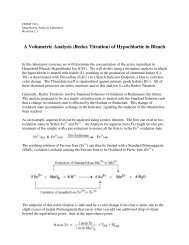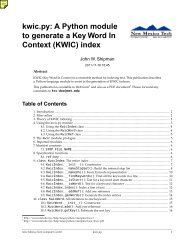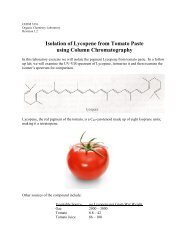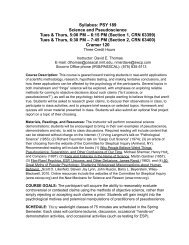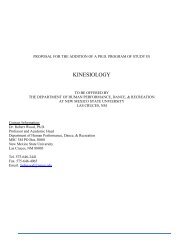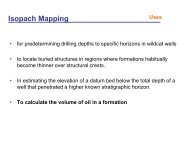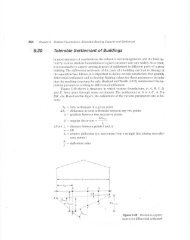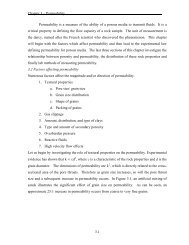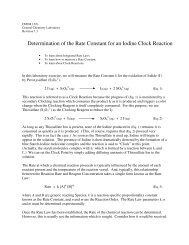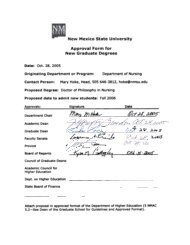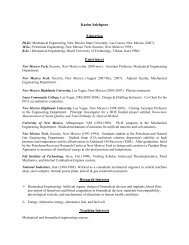Letters of Recommendation - New Mexico Tech
Letters of Recommendation - New Mexico Tech
Letters of Recommendation - New Mexico Tech
Create successful ePaper yourself
Turn your PDF publications into a flip-book with our unique Google optimized e-Paper software.
<strong>Letters</strong> <strong>of</strong><br />
<strong>Recommendation</strong><br />
Produced by the Career Services Office, Wells Hall 111,<br />
and the Graduate Studies Office, Fitch Hall 203<br />
This packet can be found in pdf format at<br />
http://infohost.nmt.edu/~grad/studentinfo/support/RecoWrbk.pdf
General Tips<br />
♦ <strong>Letters</strong> should be 2-3 pages, preferably 2<br />
♦ Applicants should have 3-5 letters<br />
♦ A meeting between the applicant and letter writer should take place to discuss<br />
everything from the applicant’s goals to their experiences and the deadline for when<br />
the letter should be sent <strong>of</strong>f<br />
♦ <strong>Letters</strong> should tell how well an applicant accomplished what is laid out in the applicant’s<br />
résumé or CV<br />
♦ If a writer cannot think <strong>of</strong> supportive information to include in the letter, they should<br />
decline the applicant’s request for a recommendation, be candid, be helpful, and<br />
suggest another writer (if possible)<br />
♦ The letter should be written on letterhead when possible<br />
♦ All letters will have items in common but each should be specific enough to be different<br />
from one another<br />
♦ <strong>Letters</strong> should include multiple specific examples<br />
♦ Only say what you are in a position to say<br />
♦ <strong>Letters</strong> should be written with care and in the writer’s best prose<br />
♦ <strong>Letters</strong> should not include vague statements<br />
♦ Statements <strong>of</strong> opinion should be clearly identified and explained<br />
♦ Family members should never write a letter<br />
♦ Formal thank-you notes should be sent from the applicant to each letter writer<br />
What Information Should be Supplied to Letter Writers?<br />
♦ Any required forms with appropriate signatures<br />
♦ Résumé that includes current name, address, e-mail address, and phone number; GPA;<br />
major(s) and minor(s); list <strong>of</strong> pr<strong>of</strong>essional organizations/honor societies; awards;<br />
activities; skills; work experience<br />
♦ Statement <strong>of</strong> purpose<br />
♦ Position description/advertisement<br />
♦ Description <strong>of</strong> short-term and long-term goals<br />
♦ Course list with grades earned<br />
♦ Titles and abstracts <strong>of</strong> research papers, exams(s), and/or lab reports<br />
♦ Specific documents, such as papers, graded by the letter writer<br />
♦ All information already provided to the organization (employer or graduate school,<br />
etc.)<br />
♦ Service activities<br />
♦ Information about specific ways the applicant approached given situations/problems<br />
♦ Feedback from others, such as copies <strong>of</strong> teaching evaluations when applicable<br />
♦ Stamped, addressed envelope<br />
Who Should Write a Letter <strong>of</strong> <strong>Recommendation</strong>?<br />
♦ Advisor<br />
♦ Faculty who taught the applicant in small/intensive courses<br />
♦ Faculty with whom the applicant has worked on research<br />
♦ People who have worked closely with the applicant, especially in a supervisory role<br />
3
♦ A person who is in the field to which the applicant is applying<br />
♦ People who are supportive <strong>of</strong> the applicant<br />
♦ A person in industry<br />
♦ A senior person in the department, especially if there is a problem between the<br />
applicant and their academic advisor (this person should address that situation)<br />
What Should a Letter <strong>of</strong> <strong>Recommendation</strong> Include?<br />
♦ Personal characteristics <strong>of</strong> the applicant<br />
♦ Information on performance with examples<br />
♦ Experience<br />
♦ Pr<strong>of</strong>essional promise (especially as compared to others)<br />
♦ Examples and an assessment <strong>of</strong> the applicant’s research skills<br />
♦ Examples <strong>of</strong> thoughtful contributions to class discussions by the applicant<br />
♦ Examples <strong>of</strong> the applicant’s interpersonal skills<br />
♦ Examples <strong>of</strong> the applicant’s leadership skills<br />
♦ An explanation <strong>of</strong> a weakness, such as a hardship that affected the applicant’s record<br />
(this should only be done with the permission <strong>of</strong> the applicant)<br />
♦ Information specifically relevant to the position description/advertisement<br />
What do Employers Look For?<br />
♦ The writer’s relationship with the applicant<br />
♦ Anecdotes about the applicant’s strengths<br />
♦ Information on a wide range <strong>of</strong> skills<br />
♦ Specific experiences<br />
♦ The applicant’s ability to work with others<br />
♦ The applicant’s ability to accept positive and negative criticism<br />
♦ The ability <strong>of</strong> the applicant to be pr<strong>of</strong>essional<br />
♦ The applicant’s enthusiasm<br />
♦ The applicant’s ability to be in a supervisory role<br />
♦ The applicant’s ability to teach others<br />
♦ Language particular to the position description (when applicable)<br />
♦ The letter is specific to the organization to which the applicant is applying<br />
♦ What’s missing<br />
What Should not be Included?<br />
♦ Unflattering remarks about the applicant<br />
♦ Comments on the applicant’s race, religion, disabilities, national origin, and/or marital<br />
or parental status<br />
♦ Any negative implication that may destroy the applicant’s ability to obtain the<br />
position/award<br />
♦ Faint praise<br />
Parts <strong>of</strong> a Letter <strong>of</strong> <strong>Recommendation</strong><br />
Opening<br />
♦ An explanation <strong>of</strong> the relationship between the author and the applicant, including type<br />
<strong>of</strong> experience, length <strong>of</strong> time known, and period <strong>of</strong> time known<br />
4
♦ Identification <strong>of</strong> the letter writer’s pr<strong>of</strong>essional position<br />
♦ An overview that details general impressions <strong>of</strong> the applicant<br />
Body: Each paragraph should contain a specific example<br />
♦ Verification <strong>of</strong> experiences<br />
♦ Personal Characteristics: These could include creativity, confidence, dependability,<br />
patience, and poise<br />
♦ Areas <strong>of</strong> Strength: These could include enthusiasm, excellent communication skills, high<br />
energy, strong background in subject area, research projects, and a ranking <strong>of</strong> the<br />
student as one <strong>of</strong> the most articulate, clear-thinking, curious, motivated, or original<br />
students/people you have known<br />
♦ Teaching Abilities (if appropriate): Subject knowledge, problem-solving abilities,<br />
classroom management abilities, collegiality issues, and curriculum development<br />
experience<br />
Closing<br />
♦ Summary <strong>of</strong> points<br />
♦ Clearly stated recommendation <strong>of</strong> the applicant<br />
Employer <strong>Letters</strong> vs Academic <strong>Letters</strong><br />
Employer <strong>Letters</strong><br />
<strong>Letters</strong> from employers should contain information such as the positions the applicant has<br />
held with the organization; a summary <strong>of</strong> the applicant’s job responsibilities; the<br />
applicant’s strengths, skills, talents, initiative, dedication, integrity, and/or reliability; the<br />
applicant’s ability to work with a team; and the applicant’s ability to work independently.<br />
Academic <strong>Letters</strong><br />
<strong>Letters</strong> from faculty should address the applicant’s academic performance, honors and<br />
awards, initiative, dedication, integrity, willingness to follow school policy, ability to work<br />
with others, and/or ability to work independently.<br />
5
Tips for Applicants<br />
<strong>Letters</strong> <strong>of</strong> recommendation should be positive about you and your abilities and be written<br />
by someone who has known you for an extended period <strong>of</strong> time and has relevant expertise<br />
for the position to which you are applying. Throughout your studies, there should be faculty<br />
members with whom you have had a great deal <strong>of</strong> contact and who know your abilities and<br />
goals. Rather than choosing someone because <strong>of</strong> their stature in the field, it is best to ask<br />
someone who is impressed by you and will, therefore, write a good letter for you.<br />
When asking for a letter, be sure to let the prospective writer know why you are applying<br />
for a particular position/award and ask them if they will support you and recommend you<br />
for that position/award. Supplying a packet <strong>of</strong> information to them ahead <strong>of</strong> time and sitting<br />
down with them for a meeting will help you and the prospective writer(s) decide if they are<br />
the right person for the job. In the materials and the meeting, speak well <strong>of</strong> yourself and<br />
stress your strengths. You should make the case that you are deserving <strong>of</strong> the<br />
position/award.<br />
Remember that letters should take a great deal <strong>of</strong> time to write, so be confident the person<br />
you have asked wants to write and will write you a good letter. Letter writers should be<br />
given at least four weeks to write and send <strong>of</strong>f the letter. You may give the letter writer a<br />
reminder approximately 10 days before the letter is due but should not ask to see the<br />
letter.<br />
If you have any reservations about a letter writer, you should probably not have them write<br />
a letter and may want to ask them to suggest another letter writer. If you are asked to write<br />
the letter, which your writer will then sign, consider whether you have asked the right<br />
person.<br />
If you have a troubled relationship with your advisor, especially the chair <strong>of</strong> your thesis or<br />
dissertation committee, make sure you get a senior member <strong>of</strong> your department to write a<br />
letter that addresses that situation directly or indirectly. If you cannot do so, then you<br />
should address the situation yourself.<br />
It is best to have letters specific to each position/award. However, it is worthwhile to have<br />
letters in your Career Services placement file just in case. For each letter, you should write<br />
a thank-you note and keep the writer up-to-date with what you are doing as you will likely<br />
want them to write another letter in the future. Before you write the thank-you note, check<br />
to make sure that the letter reached its destination.<br />
6
Legal Issues in Writing<br />
<strong>Letters</strong> <strong>of</strong> <strong>Recommendation</strong><br />
Family Educational Rights and Privacy Act <strong>of</strong> 1974 (“FERPA”)<br />
♦ Gives students the right to consent to disclosure before any part <strong>of</strong> the student’s<br />
educational record is disclosed by an educational institution or one <strong>of</strong> its employees.<br />
♦ A letter <strong>of</strong> recommendation is considered an education record if a faculty member, in<br />
his/her role as a faculty member, writes the letter about the student’s tenure at the<br />
university.<br />
♦ Students can waive access to their letters <strong>of</strong> reference. Once waived, the student has no<br />
right to review the letters <strong>of</strong> reference. This waiver must be explicit and in writing.<br />
Right to Privacy<br />
♦ Specific areas are prohibited from disclosure, including age, disability, gender, marital<br />
status, medical information, national origin, race, and religion.<br />
Defamation<br />
Verbal (slander) or written (libel) communication that:<br />
♦ Harms the reputation, ability, or character <strong>of</strong> the applicant;<br />
♦ Is received by a third party;<br />
♦ Is untrue, substantially untrue, or communicated without regard to the truth or falsity <strong>of</strong><br />
the statement; and<br />
♦ Causes damages to any person.<br />
Defenses<br />
♦ Truth <strong>of</strong> the statement<br />
♦ Consent to release the information<br />
♦ The statement was protected by a qualified privilege<br />
Qualified Privilege<br />
Negative employment references may not be legally actionable if:<br />
♦ The communication is based upon an evaluation <strong>of</strong> the person’s work and ability and is<br />
made by someone who has knowledge <strong>of</strong> the person’s work and ability;<br />
♦ The communication is limited to information that is job-specific;<br />
♦ The communication is disclosed to prospective employers to satisfy legitimate business<br />
needs;<br />
♦ The communication is not done with malice or intentional harm; and<br />
♦ The accuracy <strong>of</strong> the information provided is verified prior to its disclosure.<br />
Negligent Referral<br />
♦ Writers must exercise reasonable care when referring a student for employment.<br />
♦ If the writer has knowledge <strong>of</strong> issues that would make the potential employee<br />
dangerous and failed to provide this information to the prospective employer, the<br />
employer could bring an action against the writer for negligent referral.<br />
7
Employer Immunity in <strong>New</strong> <strong>Mexico</strong><br />
An employer is immune from civil liability from disclosure if the writer:<br />
♦ Acts in good faith;<br />
♦ Acts without malice or reckless disregard;<br />
♦ Discloses accurate, job-related information; and<br />
♦ Handles the information in a controlled, proper manner.<br />
(This does not apply to administrators, faculty, or friends <strong>of</strong> the applicant.)<br />
E-mail<br />
♦ E-mail is not protected correspondence.<br />
8
<strong>Recommendation</strong> Letter Guidelines<br />
Specific to Schools<br />
Academic Graduate Schools<br />
Graduate schools are primarily interested in receiving letters <strong>of</strong> recommendation from<br />
pr<strong>of</strong>essors who know the applicant and his/her work. These letters should include<br />
summary estimates <strong>of</strong> the candidate’s promise as a graduate student. Specific examples<br />
should be included as <strong>of</strong>ten as possible.<br />
The following questions should be answered by the letter (if possible and appropriate):<br />
♦ How would you rate the candidate’s overall intelligence?<br />
♦ How well does the candidate learn and retain information?<br />
♦ How skilled is the candidate in analysis and logic?<br />
♦ Is the candidate able to deal with complex and abstract issues?<br />
♦ Is the candidate creative?<br />
♦ What is the candidate’s breadth and knowledge <strong>of</strong> the field to which they are applying?<br />
♦ Does the candidate have field and/or research experience?<br />
♦ Does the candidate have appropriate laboratory techniques?<br />
♦ Can the candidate effectively communicate verbally and in writing in a clear, forceful,<br />
well-organized manner?<br />
♦ Is the candidate efficient and diligent?<br />
♦ Is the candidate motivated?<br />
♦ Can the candidate work independently?<br />
♦ Is the candidate sufficiently mature for graduate study?<br />
♦ Does the candidate have specialized skills in the field?<br />
♦ How would you rate the candidate compared to others?<br />
♦ Are there any situations that have affected the candidate’s academic record?<br />
(Remember, the candidate must be asked before this information can be included.)<br />
Business Schools<br />
Schools <strong>of</strong> business expect recommendations from pr<strong>of</strong>essors and employers who know<br />
the applicant and his/her academic and pr<strong>of</strong>essional work. Specific examples should be<br />
included as <strong>of</strong>ten as possible.<br />
♦ Can the candidate effectively establish and maintain relationships?<br />
♦ How does the candidate work with others, including supervisors, peers, and<br />
subordinates?<br />
♦ Can the candidate delegate responsibility?<br />
♦ Is the candidate sensitive to less competent persons?<br />
♦ What is the candidate’s potential for future success in business?<br />
♦ Can the candidate work in a team environment?<br />
♦ Has the candidate sought and been able to create opportunities?<br />
♦ Does the candidate accept constructive criticism?<br />
♦ How does the candidate accept a challenge?<br />
♦ Does the candidate admit mistakes?<br />
♦ Is the candidate able to ask for help?<br />
♦ Is the candidate able to grasp new ideas?<br />
9
♦ How has the candidate shown creativity?<br />
♦ Can the candidate effectively communicate verbally and in writing?<br />
♦ Is the candidate persistent? motivated? efficient?<br />
♦ What is the probable performance <strong>of</strong> the candidate in business study?<br />
♦ Has the candidate carefully considered plans for graduate study?<br />
♦ How does this candidate compare with his/her peers who are applying to business<br />
schools?<br />
♦ Are there any situations that have affected the candidate’s academic record?<br />
(Remember, the candidate must be asked before this information can be included.)<br />
Law Schools<br />
Law schools are specifically interested in recommendations from pr<strong>of</strong>essors and<br />
employers. <strong>Letters</strong> should be specific and detail the capacity and length <strong>of</strong> time the writer<br />
has known the applicant. Specific examples should be provided.<br />
♦ Is the candidate the type <strong>of</strong> person you would consult as an attorney?<br />
♦ Is the candidate trusted and respected by faculty and students?<br />
♦ How would you assess the candidate’s analytical skills?<br />
♦ Is the candidate able to quickly and effectively grasp new ideas?<br />
♦ Can the candidate deal well with complex and/or abstract problems?<br />
♦ Can the candidate effectively communicate verbally and in writing?<br />
♦ Is the candidate persistent?<br />
♦ Is the candidate motivated?<br />
♦ What is your prediction <strong>of</strong> the candidate’s ability to succeed in law school?<br />
♦ In a rigorous program, where would the candidate be: the top quarter, half, or below?<br />
♦ Are you specifically familiar with legal education?<br />
♦ Are there any situations that have affected the candidate’s academic record?<br />
(Remember, the candidate must be asked before this information can be included.)<br />
Medical Schools<br />
<strong>Letters</strong> should be written by at least two science pr<strong>of</strong>essors and one humanities pr<strong>of</strong>essor.<br />
<strong>Letters</strong> should be specific.<br />
♦ Is the candidate able to deal with complex and abstract issues?<br />
♦ How would you rate the candidate’s general intelligence?<br />
♦ Can the candidate effectively communicate verbally and in writing?<br />
♦ What evidence is there that the candidate has been a lifelong learner?<br />
♦ Is the candidate capable <strong>of</strong> handling the load <strong>of</strong> medical school?<br />
♦ Does the candidate have specific medical experience such as volunteering in a healthcare<br />
setting?<br />
♦ Does the candidate have the integrity and emotional maturity necessary for the field <strong>of</strong><br />
medicine?<br />
♦ Could the candidate discuss sensitive topics with a variety <strong>of</strong> people?<br />
♦ Would you trust the candidate to care for a loved one?<br />
♦ How does the candidate compare with past students who have applied and gone on to<br />
medical school?<br />
♦ If you believe the candidate’s curriculum has been particularly challenging, explain<br />
why you think so?<br />
10
♦ What makes this candidate stand out?<br />
♦ Does the student consistently help others?<br />
♦ What observations have illuminated strengths or weaknesses <strong>of</strong> the candidate?<br />
♦ Are there any situations that have affected the candidate’s academic record?<br />
(Remember, the candidate must be asked before this information can be included.)<br />
11
SAMPLE A<br />
Sample <strong>Letters</strong><br />
"I first knew X in the spring <strong>of</strong> l986 when she was a member <strong>of</strong> my Freshman Seminar, '. . . .` In such<br />
small groups teacher and students come to know one another in a way that is seldom, if ever, possible in<br />
large lecture courses. In either forum something can be learned about a student's academic ability, but<br />
only in the former can one get a reliable measure <strong>of</strong> the student as a person. . . . Having kept in touch<br />
with X in the intervening years, I am confident in my knowledge <strong>of</strong> her.<br />
To begin with, she is an excellent student, with a lively curiosity that makes her dissatisfied with<br />
superficial explanations. That curiosity frequently led our seminar down avenues and into areas that,<br />
otherwise, would have remained unexplored. . . .<br />
One has only to speak to her to recognize her openness and eagerness. It is easy to mistake this for<br />
naivete, an error I made when she first told me she had signed up to be an apprentice teacher in one <strong>of</strong><br />
Boston's more notorious inner city high schools. . . . Throughout the term, <strong>of</strong>ten at great cost to her own<br />
peace <strong>of</strong> mind, and sometimes in explicit conflict with the regular teacher, she continued to insist on a<br />
high level <strong>of</strong> performance from her students. She not only survived the term but won the admiration and<br />
respect <strong>of</strong> students accustomed to being patronized by teachers content to believe that nothing much can<br />
be expected.<br />
I would expect X to bring these same qualities <strong>of</strong> character to . . . . That is, an openness to new places,<br />
peoples, cultures and customs; a keen intelligence, with which to analyze and order her experience;<br />
irrepressible curiosity; and an unusual ability for dealing with people <strong>of</strong> all ages and conditions. Those<br />
qualities, combined with her toughness <strong>of</strong> character. . ., will enable her to understand and empathize<br />
with others while never losing touch with who she is."<br />
12
SAMPLE B<br />
"X has been an assistant in my laboratory during the past year, and has proven to be exceptional in<br />
several respects. First, X is exceptionally intelligent. He proved to be a very quick study, learning the<br />
elements <strong>of</strong> experimental design and the uses <strong>of</strong> microcomputers in record time. Furthermore, his<br />
questions are always thoughtful and penetrating. X threw himself into his assigned projects<br />
wholeheartedly, and shows every sign <strong>of</strong> having real talent in . . . . I was a little surprised by his high<br />
degree <strong>of</strong> enthusiasm because I knew that X was not primarily interested in . . . . When I mentioned this<br />
to him, I discovered that he has well defined career goals that mesh with the projects he was working on<br />
. . . .<br />
Second, X is exceptionally diligent and hard working. He worked many extra hours over the summer. I<br />
vividly recall coming into the lab late in the evening. . . and finding X at work. X invariably finished<br />
projects well in advance <strong>of</strong> our projected target date. X was always cheerful during this intense period,<br />
and was a joy to have in the lab.<br />
Third, X is very good at working with other people. He is exceptionally nice and considerate and<br />
sensitive. X is not only good humored and friendly, but also is good at gauging other people's level <strong>of</strong><br />
knowledge and attitudes. . . .<br />
All in all, I think X has a very bright future, and I am sure that he would benefit from . . . . Given his<br />
great intelligence and sensitivity, I am sure that he could put . . . to good use.<br />
In short, I give X my highest recommendation, and very much hope that the committee judges his<br />
application favorably."<br />
13
SAMPLE C<br />
"I am writing in support <strong>of</strong> X to . . . . I have known X since September, l986. He was a member <strong>of</strong> a<br />
small . . . tutorial that I taught in l986-87. . . . X was an active and conscientious member <strong>of</strong> the class. He<br />
challenged the rest <strong>of</strong> the class to consider issues from new perspectives and <strong>of</strong>ten asked very<br />
penetrating and important questions. He chose to take on difficult topics and handled them well. His<br />
assignments were well-written, well-supported, organized, neat, and timely. It was evident that X really<br />
desired to learn more and challenge himself. . . .<br />
X also has interest outside <strong>of</strong> academics. He has been an active member <strong>of</strong> . . . , a Harvard singing<br />
group, and a member <strong>of</strong> the campus . . . club. He is also a member <strong>of</strong> the . . . House film society. X's<br />
personality is wonderful. He is outgoing and friendly, but not dominating. He has an obvious and sincere<br />
concern for others. . . .<br />
X would be a wonderful student to have at . . . . He has skills that he is eager to share, but he is just as<br />
eager to learn. . . . I feel very confident that he will be extremely successful in all his future endeavors.<br />
He is a focussed and determined young man. I highly recommend him for . . . ."<br />
14
SAMPLE D<br />
"I am pleased to write to you on behalf <strong>of</strong> X, who is applying for a fellowship to study . . . . I have<br />
known X for two years. She took my course in . . . . More recently, I have been advising her on her<br />
thesis.<br />
X has done well in Harvard's . . . concentration. The concentration includes preparation in . . . . In<br />
addition, she has had substantial exposure to the "practical" aspects <strong>of</strong> her topic, for example through her<br />
work at . . . . Thus she is extremely well prepared to fulfill her proposed project.<br />
X has selected an area, . . . , which is <strong>of</strong> growing interest. . . . In my view as someone who studies . . .<br />
among other topics, questions such as this are severely under-researched. The proposed topic - . . . -<br />
seems to be both worthwhile and feasible, and should prove very interesting.<br />
X is an independent self-starter. While she has no trouble working in groups, or interacting with others,<br />
she can also work well on her own. Furthermore, she is mature and personable. I would expect her to<br />
perform well in a wide range <strong>of</strong> environments. In fact, her personality and skills should place her high<br />
on any list <strong>of</strong> good "representatives" for the U.S.<br />
I hope that you will consider her application strongly."<br />
15
SAMPLE E<br />
"This letter is in support <strong>of</strong> X, who is applying for a . . . grant. I have read his statement <strong>of</strong> purpose with<br />
great care; in fact, I have had many discussions with him about his project, which I find both compelling<br />
and important.<br />
X is a rare combination: he is already at this young age a seasoned expert in both literature and<br />
iconography . . . . Having taught him in a language-intensive course last year, I can bear witness to his<br />
superb command <strong>of</strong> German . . . .<br />
His project's focus <strong>of</strong> interest, the . . . , is admirably suited to someone <strong>of</strong> X's talents and industry. The . .<br />
. Institute is the ideal place to carry out such research, and I am confident that X`s discoveries will in the<br />
long run make an impact on learning in that field.<br />
Add to all this that X is a very congenial person, well-liked by teachers and fellow-students alike, and<br />
you will see why I am so positive about this bright and energetic young scholar. I endorse his candidacy<br />
with confidence and enthusiasm."<br />
Copyright © 2002-2004 by the President and Fellows <strong>of</strong> Harvard College. Permission is granted to non-pr<strong>of</strong>it educational<br />
institutions to reproduce this document for internal use provided that the Bok Center's authorship and copyright are<br />
acknowledged.<br />
Derek Bok Center for<br />
Teaching and Learning<br />
Harvard University<br />
Science Center 318<br />
One Oxford Street<br />
Cambridge, MA 02138-2901<br />
Voice: (617) 495-4869 * Fax: (617) 495-3739<br />
http://bokcenter.harvard.edu<br />
16
Letterhead<br />
Date<br />
To:<br />
I was Tom Smith’s cooperating teacher during his student teaching assignment in the<br />
Spring 2002 semester. Tom completed sixteen weeks <strong>of</strong> student teaching in seventh grade<br />
social studies under my supervision. I am pleased to be able to write a letter <strong>of</strong><br />
recommendation for Tom.<br />
During Tom’s student teaching experience, he was highly motivated to learn as much as he<br />
could and perform to his best capabilities. He frequently put in long hours to develop<br />
lesson plans and monitor student progress. He asked for feedback on a daily basis and<br />
accepted constructive criticism with maturity. He understood his limitations as an<br />
inexperienced teacher and observed experienced teachers closely in order to improve his<br />
own teaching abilities.<br />
Tom has several strengths but his main strength, from my observations, is his ability to<br />
motivate students. He always seemed sincerely interested in their progress and presented<br />
new material in a way that captured their attention. For example, he had a group <strong>of</strong><br />
students map out a “road-trip” across the United States. The students had to plan the trip to<br />
include a given number <strong>of</strong> state and national parks, major cities, and historic battle sites.<br />
The students really dived into the project. He soon learned that the best way to manage a<br />
classroom is to keep students on-task with projects that were both interesting and<br />
challenging. He also did a good job <strong>of</strong> recognizing when a student needed special<br />
assistance or attention.<br />
In summary, Tom displayed the qualities that make a teacher successful. He is dependable,<br />
motivated, and is in tune with the needs <strong>of</strong> his students. He works well with colleagues and<br />
administration and is able to learn from those around him. I highly recommend him for a<br />
teaching position.<br />
Sincerely,<br />
© 2001 Linda Kaiser, University <strong>of</strong> Missouri-Columbia<br />
17


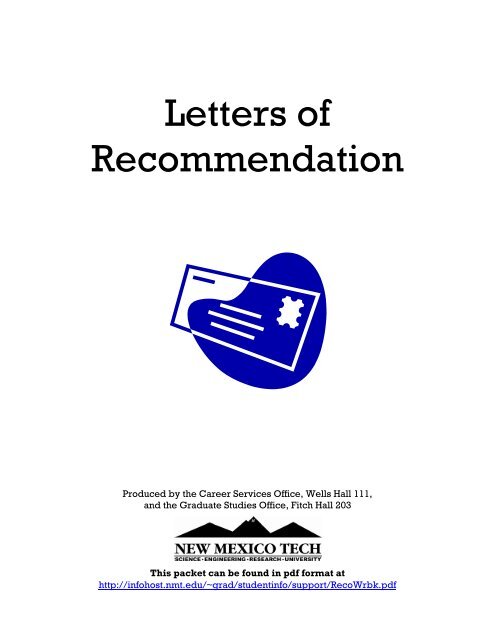
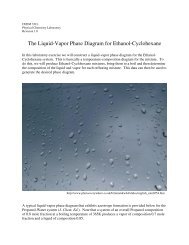
![is numerically equivalent to [0,1].](https://img.yumpu.com/21969136/1/190x245/is-numerically-equivalent-to-01.jpg?quality=85)
